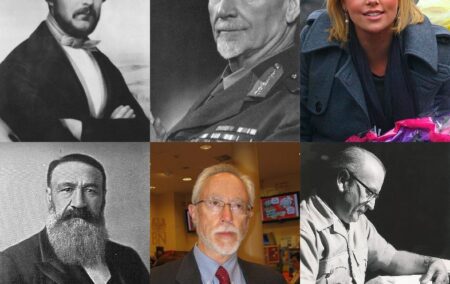Some years ago, I came up with the design for a badge: “Afrikaner Ally”. But it didn’t matter if its reference was to Pierneef or Deneys Reitz or C. Louis Leipoldt, because just as I was finishing it, I realised I would be wearing it in the most dangerous place in the world to do so. I imagined that I’d be walking through Islington (North London, one of Hamas’s satellite offices) when there would be a shriek at the door of a £2.3m Georgian townhouse, followed by the charge of a small, salt-‘n-pepper white professor woman – probably School of Oriental & African Studies or Goldsmiths – who would attack then hack me with her mixed-race child’s machete.
She would be arrested and prosecuted for my murder; in court it would emerge she had once had dinner at Ronnie Kasrils’s house in Glenhazel, and had found the evening “quite inspiring”.
Not long ago there were allies for everything – climate terrorists, MAPs, genocidal muftis. If you got gout or caught a lively strain of the clap, you could call work and Helen from HR would send one of her passive-aggressive clones to meet you at the corporate entrance and lay a lanyard around your neck (“solidarity”).
The internal Slack channel would light up with platitudes about how the company has a zero-tolerance policy toward prejudice – today we are all the clap – your bosses would be nice, and creepy Aaron from software would post on LinkedIn, congratulating himself, then his colleagues, then himself again.
South African expats
There are around 250,000 South Africans living in the UK, and roughly 220,000 living in Australia. The US already has around 130,000, followed by Dubai (100,000), then New Zealand (90,000), and Canada (50,000), before you get to the Netherlands. Some intend to return, many don’t, some of us maintain strong relations with South Africa and return home regularly, others have started new lives.
During the anxieties of the early 2000s, there was a theory circulating that if it all started going Eben Venter, the Germans would send a few Transall C-160’s and help ease the pressure of their inverting pyramid. But the country remained attached to the wisdom of men like Jan Smuts and Rian Malan – the worst things don’t happen – and in 2015, Angela Merkel, also aware of the prevailing fear of her own vanishing groups, welcomed some 300,000 Syrians.
No news crews arrived at OR Tambo when a young man called Bulelani Mfaco left the country for Ireland. Mfaco claimed he had lived a life of fear in Cape Town as a gay man, so he applied for asylum – where he discovered “dozens” of others applying on the same grounds. Mfaco wasn’t excoriated, GOOD’s Brett Herron didn’t take out an indignant op-ed with the “I’m-a-gay-and-not-a-refugee” line and no foreign affairs officials started looking into the penalties for the young gay should he ever decide to return.
Despite Cape Town’s burgeoning gay scene, the pink dollar, attached travel guide and no song threatening to kill gays, the same groups jeering the repatriation of 49 South Africans to the US ostensibly – by their silence – agreed with Mfaco’s motive.
Recriminations
Recriminations are now swamping forums and cable news. The people who covered up the former US President’s mental decline are hinting at a conspiracy of “white supremacy”. People who’ve lied on their CVs are accusing the 49 of lying on their applications, and people who seek to amplify their “lived experiences” on CapeTalk are now denying others their opportunities.
A charming young rent boy called Pieter Kriel is renting himself to the supposedly enlightened, progressive quarters of social media. The Episcopalian Church has announced it wants nothing to do with the arrivals, possibly hoping that its virtue on the issue will distract its congregants from asking exactly why the former Archbishop of Canterbury covered up the bumming of Zimbabwean choirboys by an Englishman. Missing is analysis of elementary human desire, chiefly, charity, and living with the idea that better things could lie ahead.
For the first time possibly ever, Afrikaners – whites – have a major “ally”. Scolded by commentators for being bigoted, excluded by social engineering (“quotas”), shamed in Parliament, abandoned by business leaders, and confused by the idea that their rights are protected just as much as the song encouraging their murder, the appearance of solidarity emerged for some – and they leapt at its prospects.
Enraged
Would we be this enraged if the Sultanate of Oman were to offer the same opportunities to restart under the same conditions to inhabitants of the Cape Flats? I doubt it. We would encourage them to leave – best wishes and all, stay in touch.
The real culprit here is the distinctly unAfrican, white-English-Marxist management style beloved by quarters of the ANC and its deluded sympathisers – evident in statements such as “impunity from transformation”. Ultimately this is what failed, what continues to fail, and why its enthusiasts are so upset.
They couldn’t convince or force groups to adhere to their logic of presentism or looking backward. They couldn’t influence people to forsake their own instincts, cross over an ideological divide and be ruled according to elitist, synthetic prescripts. These anti-property rights, anti-business, anti-free speech, race-baiting, Hamas-loving, atrocity-excusing, expert-idolising, wrong-about-everything progressives have failed – and they are very cross about failing.
The views of the writers are not necessarily the views of the Daily Friend or the IRR.
If you like what you have just read, support the Daily Friend
Image: Andries_Pretorius.jpg: InconnuJanSmutsFM.png:Xdamr at en.wikipediaPjjoubert.jpg: InconnuCharlizeTheronFeb08.jpg: John Harrison at https://www.flickr.com/photos/15512543@N04/J.M._Coetzee.JPG: Mariusz Kubik, http://www.mariuszkubik.plCoertsteynberg1.jpg: Etienne Maraisderivative work: Titimaster, CC BY-SA 3.0 https://creativecommons.org/licenses/by-sa/3.0, via Wikimedia Commons

